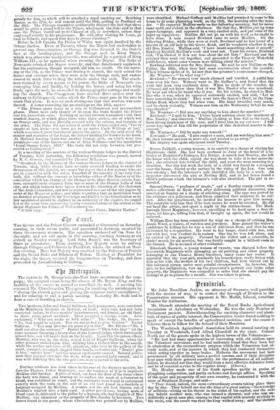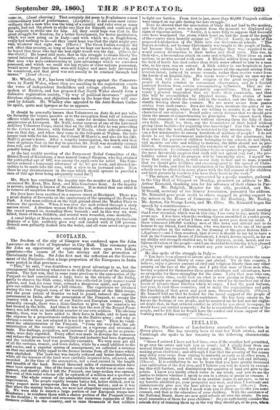Vanuatu!.
Mr. John Trevillian Senkin, an attorney of Swansea, well provided with the sinews of war, is to contest the borough of Honiton in the Conservative interest. His opponent is Mr. Moffat, Liberal, sometime Member for Ashburton.
Mr. Disraeli attended the meeting of the Royal Bucks Agricultural Association at Aylesbury on Wednesday. He was the only Member of Parliament present. Notwithstanding the exciting character and pleni- tude of topics of public interest, the Conservative leader found nothing to speak of except the benefits. of agricultural societies, and the course it behoves them to follow ibr the behoof Of their Members.
The Woodstock Agricultural Aisociation held its annual. meeting on Tuesday at Woodstock,, Lord Alfred Churchill in the chair. Colonel North one of the guests spoke in the highest terms of the Volunteersi-- "He had had many oppodunities of conversing with old soldiers upon the Volunteer movement, and he had uniformls, found that they been lost in admiration at the extraordinary progress which the Volunteers had al- ready made, and at the manner in which they had conducted themselves when acting together in large bodies. Hitherto the movement had been pronounced by all military meals perfect success, and if their discipline kept pave with their general capability for the performance of all military duties, he doubted not that they would.form a most effective defensive force, and be of essential service to the regular Army. (Cheers.)
Mr. Henley made one of his frank. speeches partly in praise of ploughing competition, and partly on home and foreign affeirs. Speaking of the quiet and prosperity of our own country, he contrasted it with the state of Southern Europe, and said-
" They found, indeed, the most extraordinary-events taking place there day by day. They beheld one day the king of a great nation—the sovereign of millions—sitting on his throne in the midst of his capital, and the next day beheld another man; who was termed a dictator, and who was un- doubtedly a great man also, coming to that capital with scarcely anybody in his train, and the result was that theking- walked away, and the-dictator came in, (Loud cheering.) That eertainly did seem to Englishmen a most extraordinary kind of performance. (Laughter) It did seem most extra- ordinary that a man who was the king of a country and ruler over so many people, had not the,pluck to strike one blow for himself, and could not get his subjects to strike one for him. AU they could hope was that in the great struggle for freedom, for a better Government, for better institutions, which was now going on in Italy—and with which as, as Englishmen, really had nothing to do—all they could hope was that the right might pre- vail, whatever that right was.. (Cheers.) The Great Italian struggle did not affect this country, so long at least as we kept our hands clear of it, and he hoped that those who had the best right would win the day. (Cheers for . Garibaldi.) He hoped still more, that in this struggle to obtain liberty the sacred interests) of justice, of humanity, and of truth might not suffer, and that men who were endeavouring to gain advantages which we ourselves possessed, and which we could not but rejoice at other nations possessing, would never forget that there were still higher and more holy interests to be considered, and that good was not usually to be attained through bad means." (Loud cheers.)
Mr. Whalley, M.P., has been taking the stump against the Conserva- tives in North Wales, where they are assailing in the registration courts the votes of independent freeholders and cottage electors. He has spoken at Rttabon, and has proposed that North Wales should form a defensive registration society, "by way of political insurance" against frivolous objections, and objections made in the hope that they will sue- -ceed by default. Mr. Whalley also appealed to the Anti-Roman Catho- lic spirit, quite mil apropos so far as. appears.
It should be generally known that Volunteers on duty do not pay tolls. On Saturday the veienta qutestio as to the exemption from toll of volunteer officers while in uniform and on duty, came for decision before the county magistrates at Liverpool. Mr. Neill, senior surgeon of one of the Liverpool Artillery Volunteer Corps, stated that on the 14th of July he was proceeding to the review at Aintree, with Colonel M'Murdo, whose aide-de-camp he was on that day, and when they came to the toll-gate at Walton, the toll- keeper took tolls for his horse, for Colonel MMurdo's, and also for his (Mr. Neill's) groom's horse. After a lengthy investigation, the bench said they were of opinion that on the day in question Mr. Neill was decidedly exempt from toll, and the toll-keeper must therefore pay 5s. and costs, the full penalty being Si.
At the last weekly meeting of the Permanent Relief Committee of the Bristol Board of Guardians, a man named Samuel Shepton, who has attained the patriarchal age of 102, was among the applicants for relief. The Com- mittee ordered a temporary allowance of 33. 6d. per week, and directed in- qufries to be made into the case, with a view to an increased order. [Can there be any circumstances in the case which should operate to prevent a man of this age from being adequately cared for?] Mr. Slack has continued his inquiry into the murder at Road, and has examined Mr. Kent, Mrs. Kent, and Miss Constance Kent. As the inquiry is private, nothing is known of its substance. It is stated that one effect is to remove all suspicion from Miss Constance Kent.
Six lives have been sacrificed in a narrow street at Stockport. There was a great display of fireworks on the anniversary of the opening of the People's Park. A vast mass collected on the high ground about the Market Place to witness the spectacle. When it was over the mob retired through a steep narrow street. A drunken woman fell in the van, others stumbled over her, the crowd pressed on, trampling those beneath ; and in this way six were killed, three of them children, and several were wounded, some mortally.
A canal bridge at Manchester, crowded with people watching the fantastic displays of a fair, suddenly gave way and carried with it 150 persons. Several men gallantly dashed into the water, and all were saved except one child.



























 Previous page
Previous page